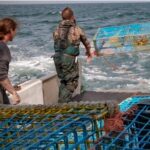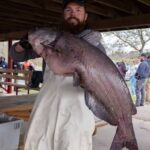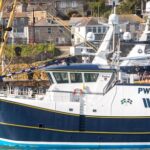Tag Archives: 1992 cod moratorium
Icewater Seafoods processes northern cod for the first time in 32 years
 For over three decades, Icewater Seafood’s Arnolds Cove fish plant has kept itself going processing fish from other countries. But on Feb 24, 2025, the plant processed its first N.L. offshore cod since the moratorium in 1992. Plant workers were thrilled this week to be processing local cod. Not only did it mean they get to work with fresher and higher quality fish, but it means more money will be coming their way. Janet Hynes has been at the plant for 38 years and remembers the day operations shut down due to the moratorium. “We were devastated,” said Hynes. “We didn’t really know what was going to happen at that time.” Over the past 32 years, quality control coordinator Brenda Hickey, said she never gave up hope. “I was thinking this is going to come back … and it did. We’re super excited,” she said. more, >>CLICK TO READ<< 09:41
For over three decades, Icewater Seafood’s Arnolds Cove fish plant has kept itself going processing fish from other countries. But on Feb 24, 2025, the plant processed its first N.L. offshore cod since the moratorium in 1992. Plant workers were thrilled this week to be processing local cod. Not only did it mean they get to work with fresher and higher quality fish, but it means more money will be coming their way. Janet Hynes has been at the plant for 38 years and remembers the day operations shut down due to the moratorium. “We were devastated,” said Hynes. “We didn’t really know what was going to happen at that time.” Over the past 32 years, quality control coordinator Brenda Hickey, said she never gave up hope. “I was thinking this is going to come back … and it did. We’re super excited,” she said. more, >>CLICK TO READ<< 09:41
Will Reviving the Cod Industry Doom It Yet Again?
 It’s been thirty-two years since the federal government first closed the northern cod fishery. It was historically the colony’s main trade for centuries, but that changed, nearly overnight, in 1992, after a press conference at the downtown Radisson Hotel in St. John’s, when then federal fisheries and oceans minister John Crosbie announced a complete halt. Fishery workers would be compensated for ten weeks, at the rate of $225 a week, and then go on employment insurance. The meagre amounts were seen as an insult to the workers whose labour was responsible for a $700 million per year industry (almost $1.35 billion in 2024 terms)—and who recognized, in the mass layoff, the spectre of their culture on the brink of extinction. Of course, fishery workers weren’t the only people who would suffer from the shuttering. With fishing boats now idle, fuel sales dropped. Schools amalgamated across communities as young families moved elsewhere and school districts struggled to fill classrooms. Those of us who lived through it will remember how local businesses offering small luxuries—restaurants and cafeterias, hair salons, cinemas—all felt the sting of a laid-off workforce. more, >>CLICK TO READ<< 07:48
It’s been thirty-two years since the federal government first closed the northern cod fishery. It was historically the colony’s main trade for centuries, but that changed, nearly overnight, in 1992, after a press conference at the downtown Radisson Hotel in St. John’s, when then federal fisheries and oceans minister John Crosbie announced a complete halt. Fishery workers would be compensated for ten weeks, at the rate of $225 a week, and then go on employment insurance. The meagre amounts were seen as an insult to the workers whose labour was responsible for a $700 million per year industry (almost $1.35 billion in 2024 terms)—and who recognized, in the mass layoff, the spectre of their culture on the brink of extinction. Of course, fishery workers weren’t the only people who would suffer from the shuttering. With fishing boats now idle, fuel sales dropped. Schools amalgamated across communities as young families moved elsewhere and school districts struggled to fill classrooms. Those of us who lived through it will remember how local businesses offering small luxuries—restaurants and cafeterias, hair salons, cinemas—all felt the sting of a laid-off workforce. more, >>CLICK TO READ<< 07:48
In cod we trust: Newfoundland’s famous fish aims at a comeback, but not everyone’s happy
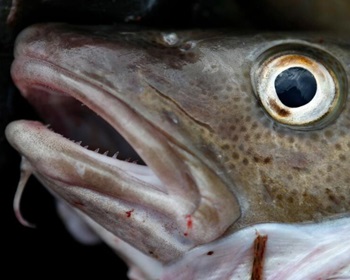 By 1992, the mighty cod had been fished to near oblivion, and the federal government declared a moratorium, indefinitely closing the industry in the hopes that the cod stock could rebuild itself over time. Some 30,000 Newfoundlanders lost their jobs and 10 per cent of the population headed west to Ontario, Alberta and beyond to find work in a mass outmigration the province has never fully recovered from. But if there is one truth in this life, it is that it is hard not to root for a good comeback story. Cod, in theory, was positioned to be such a comeback kid this summer when the federal government in June announced that the moratorium on the commercial cod fishery was being lifted after 32 years. Yet instead of parades, parties and fireworks, the announcement was met with discontent, particularly among small, inshore fish harvesters. That is, the skippers and salty olde sea dogs and their crews, wresting a living from the sea in small, 15-metre boats or less, who claim the end of the moratorium and return of the massive offshore “draggers” to the cod fishery is the beginning of the end for the North Atlantic cod 2.0. photos, more, >>CLICK TO READ<< 09:10
By 1992, the mighty cod had been fished to near oblivion, and the federal government declared a moratorium, indefinitely closing the industry in the hopes that the cod stock could rebuild itself over time. Some 30,000 Newfoundlanders lost their jobs and 10 per cent of the population headed west to Ontario, Alberta and beyond to find work in a mass outmigration the province has never fully recovered from. But if there is one truth in this life, it is that it is hard not to root for a good comeback story. Cod, in theory, was positioned to be such a comeback kid this summer when the federal government in June announced that the moratorium on the commercial cod fishery was being lifted after 32 years. Yet instead of parades, parties and fireworks, the announcement was met with discontent, particularly among small, inshore fish harvesters. That is, the skippers and salty olde sea dogs and their crews, wresting a living from the sea in small, 15-metre boats or less, who claim the end of the moratorium and return of the massive offshore “draggers” to the cod fishery is the beginning of the end for the North Atlantic cod 2.0. photos, more, >>CLICK TO READ<< 09:10
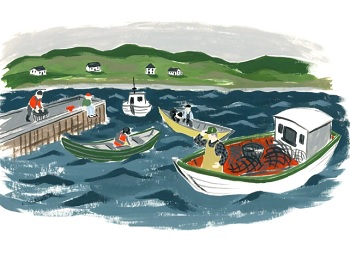
Parallels: What does Coronavirus pandemic have in common with the 1992 cod moratorium?
Barbecues, swims in cool waters and the warm summer breeze — typical beats of summer across Canada, even in 1992. That year’s summer meant a seismic shift for about 40,000 people in Newfoundland and Labrador. In an unprecedented move, due to the depleting numbers of northern cod, the federal government announced a moratorium on the cod fishery. It was a dark day in Canadian history, the moratorium sent a shockwave through Newfoundland and Labrador, ripping its people from the sea, its impact still ringing through time.,, For generations, the cod collapse has affected lives in Newfoundland and Labrador. Much like today, jobs were lost overnight and people were forced to stay at home. >click to read< 08:03


































